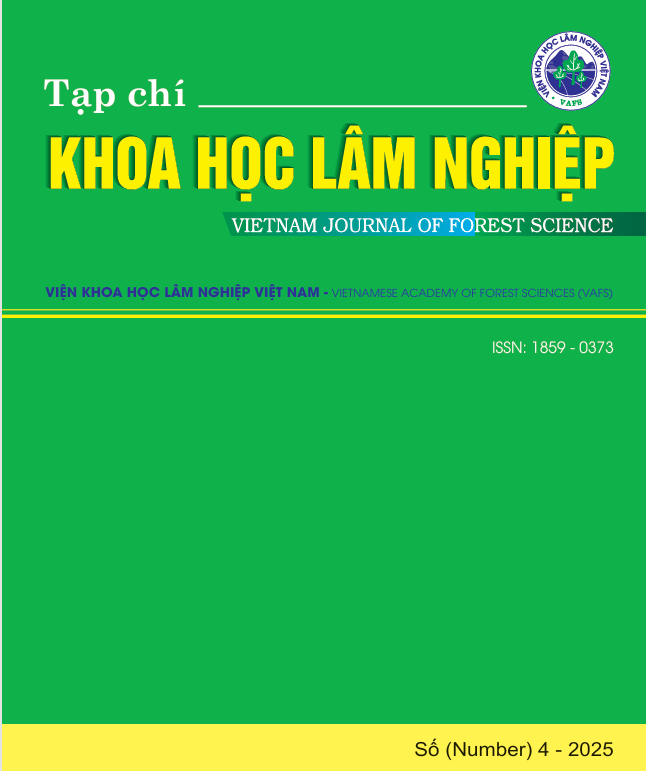HABITAT SELECTION AND TIMBER TREES UTILIZATION BY ASIAN BLACK BEAR (Ursus thibetanus Cuvier, 1823) IN PU HU NATURE RESERVE, THANH HOA PROVINCE
DOI:
https://doi.org/10.70169/VJFS.1055Keywords:
Pu Hu Nature Reserve, focal sampling, principal component analysis, suitable habitat, foraging behaviourAbstract
This study investigated the population and habitat selection of the Asian Black Bear (Ursus thibetanus) in Pu Hu Nature Reserve using camera traps and sample plots from January to December 2024. By performing frequency distribution analysis and principal component analysis (PCA) of the habitat, along with employing the focused sampling method to analyse behavioural data, the study identified and generalised the habitat selection patterns and behavioural traits of the Asian Black Bear population in the study area. The findings revealed that the Asian Black Bear typically inhabits mixed timber and bamboo forest with low canopy cover, high tree density, and a significant number of fallen trees. The habitat features include slopes on mountain ridges, a semi-south semi-north aspect, moderate altitude, gentle slopes, and a location far from water sources, roads, and human settlements. The Bear utilises trees during the fruiting season for feeding and resting. The Bear approaches the trees from the least obstructed side to climb, sitting on the canopy and using the forelimbs to bend small branches towards themselves to gather fruit. When descending, the Bear gradually slides down the trunk. This behavioural pattern helps the bears minimise energy expenditure and ensures safety while climbing up and down the trees.
References
1. Altmann, J., 1974. Observational study of behavior: sampling methods. Behavior, 49 (3): 227-267.
2. Ban quản lý khu BTTN Pù Hu, 2024. Kết quả điều tra hiện trạng phân bố quần thể và sinh cảnh sống của các loài Gấu tại khu BTTN Pù Hu. Tài liệu lưu hành nội bộ.
3. Viện Hàn lâm Khoa học và Công nghệ Việt Nam, 2024. Danh lục đỏ Việt Nam. Website: http://vnredlist.vast.vn/ursus-thibetanus/#taxonomy. Access on February 2024
4. Chính phủ nước CHXHCN Việt Nam, 2021. Nghị định 84/2021/NĐ-CP về việc sửa đổi, bổ sung một số điều của Nghị định số 06/2019/NĐ-CP ngày 22 tháng 01 năm 2019 của Chính phủ về quản lý thực vật rừng, động vật rừng nguy cấp, quý, hiếm và thực thi công ước về buôn bán quốc tế các loài động vật, thực vật hoang dã nguy cấp.
5. IUCN, 2025. Red list of Threatened species. Website: https://www.iucnredlist.org/. Access on February 2025.
6. Lê Hiền Hào, 1973. Thú kinh tế miền Bắc Việt Nam. Nhà xuất bản Khoa học và Kỹ thuật, Hà Nội, 352 trang.
7. Lu Q.B and Hu J.C, 2003. Preliminary Analysis on the habitat selection of Black Bears in the Minshan mountains. Acta Theriologica Sinica, 23(2): 98-103.
8. Nguyễn Đắc Mạnh, Đoàn Quốc Vượng, Đoàn Văn Công, Trương Viết Hợp, Nguyễn Tài Thắng và Giang Trọng Toàn, 2018. Ảnh hưởng của một số yếu tố hoàn cảnh đến tập tính lựa chọn sinh cảnh sống của Gấu ngựa (Ursus thibetanus Cuvier, 1823) tại khu bảo tồn thiên nhiên Pù Luông, tỉnh Thanh Hóa. Tạp chí Nông nghiệp và phát triển nông thôn, số 13: 80-87.
9. Nguyễn Hải Tuất, Trần Quang Bảo và Vũ Tiến Thịnh, 2011. Ứng dụng một số phương pháp định lượng trong nghiên cứu sinh thái rừng. Nhà xuất bản Nông nghiệp Hà Nội, 216 trang.
10. Ullah.Z, Mahmood.S, Iqbal.Z, Khan.J, Akhtar.N, Khan.M.A, Arif.M, Khan.R.A, Khan.M.F, Saira, Qureshi.B.U.D, Aksar. N and Yasmin.S, 2023. Habitat selection by Asiatic black bear (Ursus thibetanus) in Siran and Kaghan Valleys, Pakistan. Brazilian Journal of Biology, vol.83,e247890. https://doi.org/10.1590/1519-6984.247890
11. Zhang M.H and Li Y. K, 2005. The Temporal and Spatial Scales in Animal Habitat Selection Research. Acta Theriologica Sinica, 25 (4): 395- 401.
12. Wei F.W, Zhou. A, Hu J.C, Wang. W, Yang. G, 1996. Habitat selection by Giant Pandas in Mabian Dafengding Reserve. Acta Theriologica Sinica, 16 (4): 241-245.









